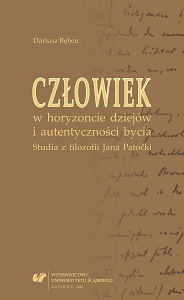Człowiek w horyzoncie dziejów i autentyczności bycia. Studia z filozofii Jana Patočki
Man in the horizon of history and authenticity of Being. Studies in the Philosophy of Jan Patocka
Author(s): Dariusz Bęben
Subject(s): Philosophy, History of Philosophy, Metaphysics
Published by: Wydawnictwo Uniwersytetu Śląskiego
Keywords: Patocka; Czech philosophy; metaphysics; Philosophy of history; Caring for the soul; phenomenology
Summary/Abstract: It is extremely difficult to identify the centre of Jan Patočka’s philosophy. This can be either the concept of natural world, but also subjective phenomenology or philosophy of history. I believe that the diversity of perspectives, and the motives that intermingle and cross with each other do not distort the centre of his thoughts, it is the struggle for authentic being of a human. Patočka addresses a human who fights for his soul which manifests in that he rejects the obvious, the absolute, the otherworldly, the certain.Patočka was critical about the history of classical metaphysics (from Plato to Husserl), believing that it aimed at what is certain and objective, and finally – absolute and eternal. He contrasted it with the Socratic uncertainty and problematicity. The concept of Patočka was particularly visible in the interpretation of Plato’s theory of ideas. The Czech philosopher showed a specific form of knowledge about the absolute transcendence with special relationship of human life to the entirety, including the primary reference to the non‑existence. Patočka emphasized the negativity as an inherent characteristic of human freedom. The horizon of this freedom is formed by temporality and historicity.Patočka’s approach to the philosophy of history is special. One can say that the concept of the Prague philosopher went beyond the framework of the classical understanding of the philosophy of history. Patočka did not treat it as a philosophical reflection on the history especially that he did not think of any historiographical reflections: the philosophy of history is not an interpretation of what happened. According to Patočka, the history always represents the history of man. The history is an objective power that is beyond the understandingof a man. On the other hand, people may only give the meaning to theirlives in the history.The history of Europe was another important topic of Patočka. Europe is a philosophical concept. When asked what was Europe, he replied by describing and clarifying its history and forces that governed it. In his deliberations, Patočka was focusing on its formation (by asking: how has Europe become Europe?) and on what happened later and was described by him as the post‑European era (why did Europe fall?). Also all that have spread between thebirth and the death, what was the course of spiritual fate of Europe, was of importance. According to Patočka, it was the caring for soul that had made the foundation of the European heritage.In the discussion concerning the meaning and the continuity of Czech history Patočka had to take the floor. Firstly, he referred to the history of the dispute, arguing against the opinions of Jungmann, Bolzana and, above all, of Masaryk. Secondly, in this context it is possible to take a wider look at the very concept of the Patočka’s philosophy of history, looking at it from the angle of its national application, in other words: from the side of the philosophical and political responsibility of individuals in their social and political lives.Because the philosophy of Patočka is closely associated with his life, the last part of the book includes his intellectual biography. It consists of two parts: the first one describes the meetings with philosophers who influenced the development of his views, starting from the Greek philosophy, through Husserl to the Comenius. All this variety of inspirations shows that the unity of the history of philosophy and the philosophy of history come to the fore in the philosophical achievements of Patočka. The second part addresses the philosophical(and personal) participation of Patočka in the political events that took place in Czechoslovakia. This is how the tragic synthesis of Socratic life and thinking took place.According to Patočka, a man who wants to live in truth must not let the calm harmony of everyday life dull him, he must open to what is disturbing and mysterious – to what is left aside by life – to be able to pass from the order of the day to the mystery of the night.
Series: Filozofia
- E-ISBN-13: 978-83-226-3032-7
- Print-ISBN-13: 978-83-226-3031-0
- Page Count: 230
- Publication Year: 2016
- Language: Polish
- eBook-PDF
- Sample-PDF
- Table of Content
- Introduction

